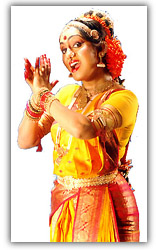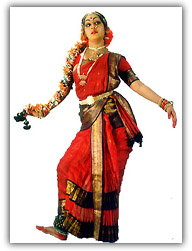
|

Mana Sanskriti (Our Culture)
|

|
Veeresalingam Kandukuri (1848-1919)
Veeresalingam Kandukuri (1848-1919) and Paravastu
Chinnayasuri are considered prophets of Modern Andhra.
Veeresalingam awakened Andhras out of their suffocating medieval orthodox
customs and superstitions. He was not only a reformer, but also a literary
activist. His literary activities were varied. He was the first to
write a Telugu novel, Telugu drama, books on natural sciences and history
in Telugu, and Telugu prose for women. He was considered the father
of renaissance in Andhra.
Veeresalingam was born into a poor Brahmin family on 16 April 1848 at Rajamundry.
His father was Subbarayudu and mother was Purnamma. He lost his father
at the age of four. In spite of poverty, his mother sent him to the
Government District School. He finished Matriculation in 1869 and worked
as a teacher in Korangi Town. Later he worked in Rajamundry City as a Senior
Telugu Pundit.
He was a reformist writer. His initial writings were in classical style
of Prabandhas. He wrote several Satakas, such as, Gopala
Satakamu, Markandeya Satakamu etc. Later he became interested
in erotic literature. His sensual writings include Suddhandhra Niroshtya
Nirvachananaishadhamu, Rasikajana Ranjanamu, Suddhandrottara Ramayanamu,
Suddharndhra Bharata Sangrahamu etc. His Abhagyopakhyanamu is a humorous
satire on the Andhra society. His novel Rajasekhara Charitram was
the first Telugu novel.
Veeresalingam was one of the greatest personalities and earliest reformers
in India to demand for radical changes in Telugu Indian society. He
had a keen insight, great courage and dynamic energy. He fought against
untruth and championed the cause of progress with vigor. He fought
for education for women, and remarriage of widows. He started Vivekavardhini,
a monthly journal, to point out and criticize the defects in the society.
He also maintained several other journals like Chintamani, Sateehitabodha,
Satyasavardhani, Satyavadi etc., and helped develop the Telugu literature
and reformation of the society. He established in 1874 a girls school
at Dhavaleswaram to encourage women's education. In 1884, he established
another school for girls at Innispeta in Rajamundry. He also established
an organization called Hitakarini Society and donated all his property for
the social activities to improve the society and support various organizations
set up by him. He ridiculed the opponents of women's education in many
satires, lampoons and drama like "Brahma Vivaham." Through his writings
he criticized early marriages, Kanyasulkam (price of bride) and marriages
of old men with young girls.
Veeresalingam developed contacts with influential British officials and
other eminent citizens of Madras. He began to give seminars to
convince the orthodox leaders that re-marriage of widows was not prohibited
by Dharma Sastra (Scriptural Law). In these seminars he used
to quote verses from scriptures to prove his point. The orthodox
leaders took up the challenge and arranged special meetings and debates to
counter Veeresalingam's arguments. The opponents of remarriage failed
to prove their point and resorted to physical violence against Veeresalingam.
He didn't back down and fearlessly established a Remarriage Association and
sent his students nook and corner of the Andhra Nation to find young men
willing to marry widows. He arranged the first widow remarriage on
December 11, 1881. Because of these reformist activities Veeresalingam
became famous even abroad. The Government, in appreciation of his work,
conferred on him the title of "Rao Bahadur" in 1893. Later he
established a Widow Home.
He also fought against the system of concubines called nauch system. Keeping
concubines was regarded as a status symbol. Most of these concubines
were from Devadasi tribe/caste. Usually in the houses of these Davadasis,
the corrupt officials made illegal deals. So, it became a common practice
to use these concubines to get favors from the officials. Veeresalingam
attacked this sexual corruption in the society.
Sir Veeresalingam Kandukuri was a multifaceted personality and he reformed
the society with his literature and revolutionary activities. He was a crusader
and one of the greatest leaders that India ever had.
References:
Telugu Sahitya Sameeksha, Nagayya G.
History of Modern Andhra, Raghunadharao P.
Happy Dasara!
Sreenivasarao Vepachedu, 10/07/2000
Copyright ©1998-2006
Vepachedu Educational Foundation,
Inc
Copyright Vepachedu
Educational Foundation Inc., 2004.
All rights reserved. All information is intended
for your general knowledge only and is not a substitute
for medical advice or treatment for special medical
conditions or any specific health issues or starting a
new fitness regimen. Please read
disclaimer.
|




